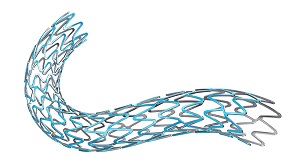Boston Scientific gets the first (partially) bioabsorbable stent to FDA approval
October 5, 2015
Source: Fierce Medical Devices
|
Boston Scientific's Synergy stent--Courtesy of Boston Scientific |
The FDA just approved its first third-generation bioabsorbable stent, to the delight of Boston Scientific ($BSX).
The company's Synergy Bioabsorbable Polymer Drug-Eluting Stent System is supposed to improve long-term outcomes because its polymer coating starts to get absorbed by the body following the completion of the elution of the drug everolimus, which takes three months.
The Synergy is considered a partially bioabsorbable stent because the devices' platinum chromium body and stent struts do not dissolve away from within the coronary artery. Abbott's ($ABT) Absorb BVS is on track to become the first fully bioabsorbable (also referred to as bioresorbable) stent to gain FDA approval.
Nevertheless, the FDA's move marks its first approval of a stent that's in the class' third treatment paradigm, following the advent of bare metal and permanent drug-eluting stents. Bioabsorbable stents are supposed improve long-term outcomes be reducing the body's exposure to foreign substances, like polymers, which can trigger inflammation reactions.
Boston Scientific says that long-term exposure to polymers is associated with stent thrombosis (the formation of a blood clot near the stent) and neoatherosclerosis (the reappearance of plaque in the coronary artery). The Synergy's bioabsorbable coating is designed to improve healing and help patients avoid those complications.
During the device's single-blind, randomized 1,684-person clinical trial, the Synergy demonstrated noninferiority to Boston Scientific's permanent drug eluting Promus Element Plus stent, as measured by target lesion failure, a composite measure of cardiac death, heart attack caused by the treated vessel and reintervention. Synergy had a target lesion failure rate of 6.7% compared to 6.5% for the Promus, a statistically insignificant difference.
In addition, the Synergy achieved a 0% definite stent thrombosis rate over 4 years, and had a target lesion revascularization (or reintervention) rate of 1.1%, Boston Scientific said in its release touting FDA approval.
"The introduction of the first bioabsorbable polymer stent in the U.S. is a tremendous milestone in the evolution of stent technology," said Kevin Ballinger, the president of Boston Scientific's interventional cardiology unit, in a statement. "The Synergy Stent is a next generation therapy designed to improve patient outcomes and ultimately reduce health care costs associated with the treatment of coronary artery disease."
Boston Scientific also said it has received FDA's permission to study the safety of the use so-called short dual anti-platelet therapy in patients at high risk of bleeding while undergoing the implantation of the synergy stent. And in July, Boston Scientific began an Australian feasibility study of a fully bioabsorbable stent based on the Synergy stent technology. The device would be akin to Abbott's BVS.
Abbott is making progress in its bid to earn the FDA approval of that fully bioabsorbable device. In September the BVS demonstrated non-inferiority to Abbott's Xience permanent drug-eluting stent in a trial for Japanese approval. Last year, Abbott announced similar, broadly positive results from a European trial designed to help achieve FDA approval.
GlobalData projects the BVS is to hit sales of $96.3 million by 2017 in the U.S. once commercialization commences, demonstrating the potential of bioabsorbable stents.
The BVS earned a CE mark in 2011, while Boston Scientific's now FDA-approved Synergy achieved European approval in 2012.
- read the release
Special Report: Leaders emerge in the race for the first U.S. bioresorbable stent
Related Articles:
Abbott bioresorbable stent comparable to its drug-eluting stent in Japanese trial
Boston Scientific heads to the clinic with its first bioabsorbable, drug-eluting coronary scaffold
U.S. to vie with India for top bioabsorbable stent market after FDA approval
Boston Scientific's Synergy Stent performs well in pivotal clinical trial
Abbott: Absorb is comparable to drug-eluting stents
Boston Scientific aims for FDA approval with absorbable stent trial


